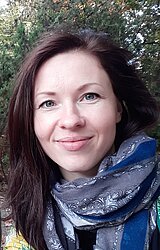Project manager
In the "Water Cultures" project, my research focuses on exploring the relationship between waterscapes shaped by beavers and human interactions with these environments, both historically and in contemporary contexts. This interest stems from my previous studies on wetland transformation politics and practices, and water management in agricultural areas throughout the 20th century, as well as my interest in rewilding initiatives, human-animal relationships, and affective ecologies.
At the core of my research interests are human-nature hybridity and nature-related meaning-making in its discursive and political aspects. My research perspective combines conceptual insights from cultural geography, environmental history, critical heritage studies and science and technology studies. In this project I analyze normative meanings of water and human-water relationships in distinct legal discourses and policies, their histories and agency in shaping the waterscape in Latvia. I also examine recreational meanings of water and the hydrocial production of rivers through water tourism and recreational boating.

PhD, leading researcher Artis Svece
The research work carried out within the framework of the project is related to the analysis of discursive and ethical aspects of the interaction between man and water. This includes study of the roles given to different aspects of the environment related to water. Particular attention in the study is paid to the understanding of the agency of water, namely, to what extent water is perceived as a passive object and to what extent – as an active environmentalist and subject of communication.
In the "Water Cultures" project, I will research the philosophical and ethical aspects of water materialities in the context of the theoretical considerations of new materialism, critical posthumanism, eco-phenomenology, and embodied critical thinking. By viewing the world through the prism of water, this project will be a continuation of my work on a processual theory of environmental philosophy. Also I am interested in the application of theory to situated knowledges that can serve as vehicles for environmental ethics in the future. Thus, I will also research the genealogies and experienced materialities of water and its symbolical and mythological meanings in Latvia by employing a meta-analysis of the site-based research of geographers, ethnographers, and anthropologists.
I am an environmental and infrastructural anthropologist employing the perspectives of political ecology. Currently, I am a doctoral student at Wageningen University & Research (Netherlands). In the previous projects I have researched the interdependencies between climate, infrastructure, technology, and lifestyle, as well as various forms of inequality and their policies of mitigation. In this project my focus is on water as infrastructure in projects and policies of biodiversity, climate and agricultural governance.

Mg. env. sc., research assistant Karīna Ješkina
My research interests are related to the knowledge of the spectrum of nature values and the analysis of the historical context of nature conservation. In my doctoral thesis, which will be developed during the project, I will focus and elaborate on how local expressions of human-water relations illustrate and reflect broader contextual features of these relations.
In the project, my research interest focuses on water as a component of socio-ecological systems – an integrated system that can be studied without separating the natural and social components.

Mg.phil. studente, vec. laborante Paula Lūcija Lejiņa
Manas teorētiskās intereses izriet no jaunā materiālisma, vides fenomenoloģijas un procesuālās filosofijas studijām. Projekta laikā izstrādātā maģistra darba ietvaros pētīšu cilvēku mijattiecības ar nekārtīgiem ūdeņiem, tas ir, ūdens materialitātes pieredzi, to dominējošo konceptuālo tvērumu un alternatīvas sadzīves formas. Pievērsīšos ūdenim - citādajam, kā dinamiskam medijam dažādu dabas-kultūras ģenealoģiju aspektu analīzē.
I am a geospatial information technology specialist with research experience in prehistoric human-water relations, focusing on the reconstruction of ancient shorelines of Holocene water bodies in the context of Stone Age settlement changes. During this project, I will provide quantitative processing and geospatial analysis of spatial data.

 CONFERENCE
CONFERENCE




